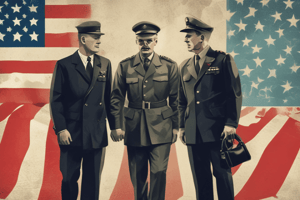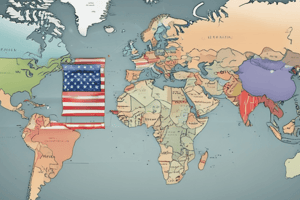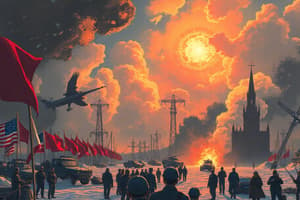Podcast
Questions and Answers
Which action directly escalated the U.S. military presence in Vietnam?
Which action directly escalated the U.S. military presence in Vietnam?
- The Tet Offensive
- The assassination of Ngo Dinh Diem
- The Gulf of Tonkin Resolution (correct)
- The fall of Saigon
What was a common result of the Tet Offensive in the United States?
What was a common result of the Tet Offensive in the United States?
- Reduced military draft numbers
- Increased support for the Vietnam War
- Formation of additional military alliances
- Heightened anti-war protests (correct)
Which organization was established to expand women's rights in the 1960s?
Which organization was established to expand women's rights in the 1960s?
- United Farm Workers (UFW)
- American Civil Liberties Union (ACLU)
- National Organization for Women (NOW) (correct)
- Vietnam Veterans of America
Who led North Vietnam during the Vietnam War?
Who led North Vietnam during the Vietnam War?
Which statement accurately describes Malcolm X's approach to Civil Rights?
Which statement accurately describes Malcolm X's approach to Civil Rights?
What was the primary purpose of the Comintern?
What was the primary purpose of the Comintern?
Which major outcome was discussed during the Yalta Conference?
Which major outcome was discussed during the Yalta Conference?
What was the significance of the 'iron curtain' as stated by Winston Churchill?
What was the significance of the 'iron curtain' as stated by Winston Churchill?
What was the main objective of the Truman Doctrine?
What was the main objective of the Truman Doctrine?
Which event tested U.S. resolve against the Soviet Union after World War II?
Which event tested U.S. resolve against the Soviet Union after World War II?
What was NATO created for?
What was NATO created for?
What concept did George Kennan introduce in 1946 regarding Soviet conduct?
What concept did George Kennan introduce in 1946 regarding Soviet conduct?
Which conference primarily discussed post-war issues related to Germany?
Which conference primarily discussed post-war issues related to Germany?
What was one of Richard Nixon's primary strategies regarding the Vietnam War?
What was one of Richard Nixon's primary strategies regarding the Vietnam War?
What was the name of Nixon's domestic program?
What was the name of Nixon's domestic program?
Which significant environmental agencies were established during Nixon's presidency?
Which significant environmental agencies were established during Nixon's presidency?
What international policy did Nixon pursue to ease Cold War tensions?
What international policy did Nixon pursue to ease Cold War tensions?
What led to Richard Nixon's resignation from the presidency?
What led to Richard Nixon's resignation from the presidency?
Which statement best describes Ford's approach to foreign relations?
Which statement best describes Ford's approach to foreign relations?
What major event during Carter's presidency severely impacted U.S. foreign relations?
What major event during Carter's presidency severely impacted U.S. foreign relations?
What was one of the main goals of the Gramm-Rudman-Hollings Act of 1985?
What was one of the main goals of the Gramm-Rudman-Hollings Act of 1985?
Which major achievement is associated with Ronald Reagan during his presidency?
Which major achievement is associated with Ronald Reagan during his presidency?
Which of the following describes the state of the economy during Ford's presidency?
Which of the following describes the state of the economy during Ford's presidency?
What significant treaty was signed during Bush's presidency that involved nuclear weapons reduction?
What significant treaty was signed during Bush's presidency that involved nuclear weapons reduction?
What was one of the three key actions Bill Clinton proposed to reduce the budget deficit?
What was one of the three key actions Bill Clinton proposed to reduce the budget deficit?
Which event was linked to Bush's foreign policy during his presidency?
Which event was linked to Bush's foreign policy during his presidency?
What change did Clinton make regarding the welfare system during his second term?
What change did Clinton make regarding the welfare system during his second term?
What was the name of the legislative agenda that the Republicans promoted during the 1994 Congressional elections?
What was the name of the legislative agenda that the Republicans promoted during the 1994 Congressional elections?
What was the significance of the Supreme Court case Plessy v. Ferguson?
What was the significance of the Supreme Court case Plessy v. Ferguson?
Which event is associated with Rosa Parks?
Which event is associated with Rosa Parks?
What was the primary domestic program initiated by John F. Kennedy?
What was the primary domestic program initiated by John F. Kennedy?
What was a key feature of Lyndon B. Johnson's 'Great Society' program?
What was a key feature of Lyndon B. Johnson's 'Great Society' program?
What major action did Kennedy take during the Cuban Missile Crisis?
What major action did Kennedy take during the Cuban Missile Crisis?
Which legislative accomplishment is associated with Lyndon B. Johnson?
Which legislative accomplishment is associated with Lyndon B. Johnson?
Martin Luther King, Jr. was known for advocating which method of protest?
Martin Luther King, Jr. was known for advocating which method of protest?
Which Arkansas governor was involved in the Central High School crisis in Little Rock?
Which Arkansas governor was involved in the Central High School crisis in Little Rock?
Flashcards
Comintern
Comintern
Communist Party's formal instrument for world revolution.
Tehran Conference
Tehran Conference
World War II planning meeting; discussed a second front, 'Four Policemen', Germany's future, and Poland.
Yalta Conference
Yalta Conference
Post-war planning meeting; discussed Eastern Europe, Soviet involvement against Japan, and the United Nations.
Potsdam Conference
Potsdam Conference
Signup and view all the flashcards
"Iron Curtain"
"Iron Curtain"
Signup and view all the flashcards
Truman Doctrine
Truman Doctrine
Signup and view all the flashcards
Berlin Airlift
Berlin Airlift
Signup and view all the flashcards
Containment Policy
Containment Policy
Signup and view all the flashcards
Civil Rights Leaders
Civil Rights Leaders
Signup and view all the flashcards
Vietnam War escalation
Vietnam War escalation
Signup and view all the flashcards
Domino Theory
Domino Theory
Signup and view all the flashcards
Ho Chi Minh Trail
Ho Chi Minh Trail
Signup and view all the flashcards
Tet Offensive
Tet Offensive
Signup and view all the flashcards
Plessy v. Ferguson
Plessy v. Ferguson
Signup and view all the flashcards
Civil Rights Movement
Civil Rights Movement
Signup and view all the flashcards
Rosa Parks
Rosa Parks
Signup and view all the flashcards
Montgomery Bus Boycott
Montgomery Bus Boycott
Signup and view all the flashcards
Little Rock Integration
Little Rock Integration
Signup and view all the flashcards
Civil Rights Act of 1964
Civil Rights Act of 1964
Signup and view all the flashcards
New Frontier
New Frontier
Signup and view all the flashcards
Great Society
Great Society
Signup and view all the flashcards
Nixon's War Strategy
Nixon's War Strategy
Signup and view all the flashcards
Nixon's Foreign Policy
Nixon's Foreign Policy
Signup and view all the flashcards
Watergate Scandal
Watergate Scandal
Signup and view all the flashcards
Nixon's Domestic Program
Nixon's Domestic Program
Signup and view all the flashcards
Nixon's Appointments
Nixon's Appointments
Signup and view all the flashcards
START Treaty
START Treaty
Signup and view all the flashcards
Solidarity
Solidarity
Signup and view all the flashcards
First Gulf War
First Gulf War
Signup and view all the flashcards
Clinton's Economic Agenda
Clinton's Economic Agenda
Signup and view all the flashcards
Contract With America
Contract With America
Signup and view all the flashcards
Ford's Presidency
Ford's Presidency
Signup and view all the flashcards
Carter's Foreign Policy
Carter's Foreign Policy
Signup and view all the flashcards
Reagan's Conservative Philosophy
Reagan's Conservative Philosophy
Signup and view all the flashcards
Gramm-Rudman-Hollings Act
Gramm-Rudman-Hollings Act
Signup and view all the flashcards
End of the Cold War
End of the Cold War
Signup and view all the flashcards
Study Notes
U.S. History II Exam Four Study Guide
- Comintern was the Communist Party's formal instrument for world revolution.
- Tehran and Yalta Conferences were crucial for post-World War II policy formulation. The Tehran Conference planned a second front in France (1944) and discussed the concept of "Four Policemen" to oversee post-war Germany. Yalta discussed Eastern Europe, Soviet involvement in the war against Japan, division of Germany and Austria, and the formation of the United Nations.
- The Potsdam Conference focused on postwar Germany and the Nazi war crimes trials; also addressed the unconditional surrender of Japan and the atomic bomb.
- The "Iron Curtain" was Winston Churchill's term for the Soviet Union's communist control of Eastern Europe.
- The Truman Doctrine was designed to contain communism's spread.
- The Berlin Airlift was an early test of resolve between the U.S. and Soviet Union, aiding West Berlin when the Soviets blocked supplies.
- NATO (North Atlantic Treaty Organization) was a mutual defense alliance formed to counter the Soviet Union.
- George Kennan's "Long Telegram" introduced the concept of containment.
- The National Security Act of 1947 created the CIA, National Security Council, and the Department of Defense.
- The Marshall Plan was an economic initiative to rebuild post-war Europe, implementing containment policies through aid.
- President Truman's Executive Order 9981 abolished racial discrimination in the armed forces.
Korean War
- The Korean War conflict was a proxy war between communist North Korea and capitalist South Korea.
- The Korean War was a "police action" rather than a declared war.
- MacArthur's and Truman's differing strategies regarding the war led to MacArthur's dismissal.
Cold War Fears
- The Cold War engendered fears of communist expansion.
- Eisenhower followed a "middle-of-the-road" domestic policy but pursued an anti-communist foreign policy.
- McCarthyism, named after Senator Joseph McCarthy, epitomized the fear of communism and made unsubstantiated accusations.
- The Federal Highway Act of 1956 significantly expanded the U.S. interstate highway system.
Civil Rights
- Truman's efforts to advance civil rights split the Democratic Party.
- The Supreme Court overturned the "separate but equal" doctrine in the 1954 Brown v. Board of Education decision.
- Rosa Parks' refusal to give up her bus seat in Montgomery launched the Montgomery bus boycott, a pivotal event in the Civil Rights Movement.
- Martin Luther King Jr. led the Southern Christian Leadership Conference (SCLC), advocating nonviolent protest.
- The Civil Rights Act of 1964 outlawed discrimination based on race, color, religion, sex, or national origin.
Vietnam War
- The Vietnam War was a complex conflict in Southeast Asia where the U.S. supported South Vietnam against communist North Vietnam and the Viet Cong.
- The Tet Offensive was a major turning point in the war.
- The Gulf of Tonkin Resolution gave President Johnson greater authority to escalate military action in Vietnam.
- The "domino theory" was a justification for American involvement in Vietnam, asserting that if one Southeast Asian country fell to communism, others would follow.
- The Vietnam War ended officially after a peace treaty was signed in 1975.
Nixon Administration
- Détente, a policy of easing Cold War tensions, characterized Nixon's presidency.
- Nixon visited both China and the Soviet Union.
- The Watergate scandal resulted in Nixon's resignation.
- Nixon appointed Henry Kissinger as National Security Advisor, who was instrumental in foreign policy.
Ford Administration
- Ford's presidency was marked by economic struggles and challenges in foreign policy.
- Inflation and unemployment were issues he contended with.
Carter Administration
- The Carter administration was affected by the Iran hostage crisis.
- The Iran hostage crisis was a major foreign policy challenge for Carter.
Reagan Administration
- Reagan's presidency pursued a conservative, anti-communist foreign policy.
- Reagan worked with Gorbachev, the Soviet leader, on nuclear arms reduction talks.
- The Cold War concluded with the fall of the Berlin Wall in 1989 and the collapse of the Soviet Union in 1991.
Clinton Administration
- Clinton proposed reducing the budget deficit.
- NAFTA, a free trade agreement, was ratified during Clinton's presidency.
Bush Sr. and Bush Jr. Presidencies
- Bush Sr. (George H.W. Bush) faced issues like the economy, terrorism, and the start of the "War on Terror."
- Bush Jr.'s (George W. Bush) presidency involved large tax cuts, economic stimulation goals, and increased military action overseas.
- Bush Jr.'s second term focused primarily on the war on terror.
Studying That Suits You
Use AI to generate personalized quizzes and flashcards to suit your learning preferences.




